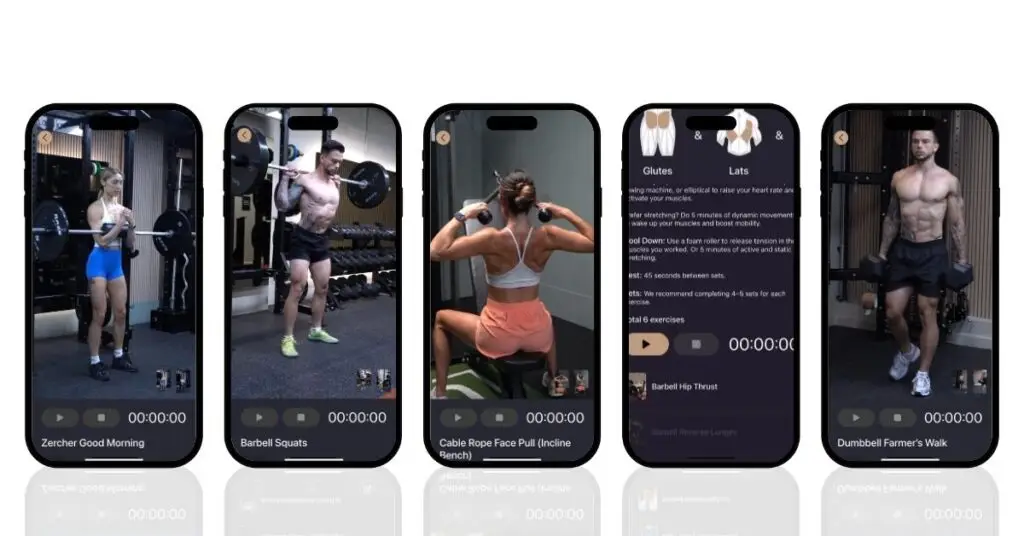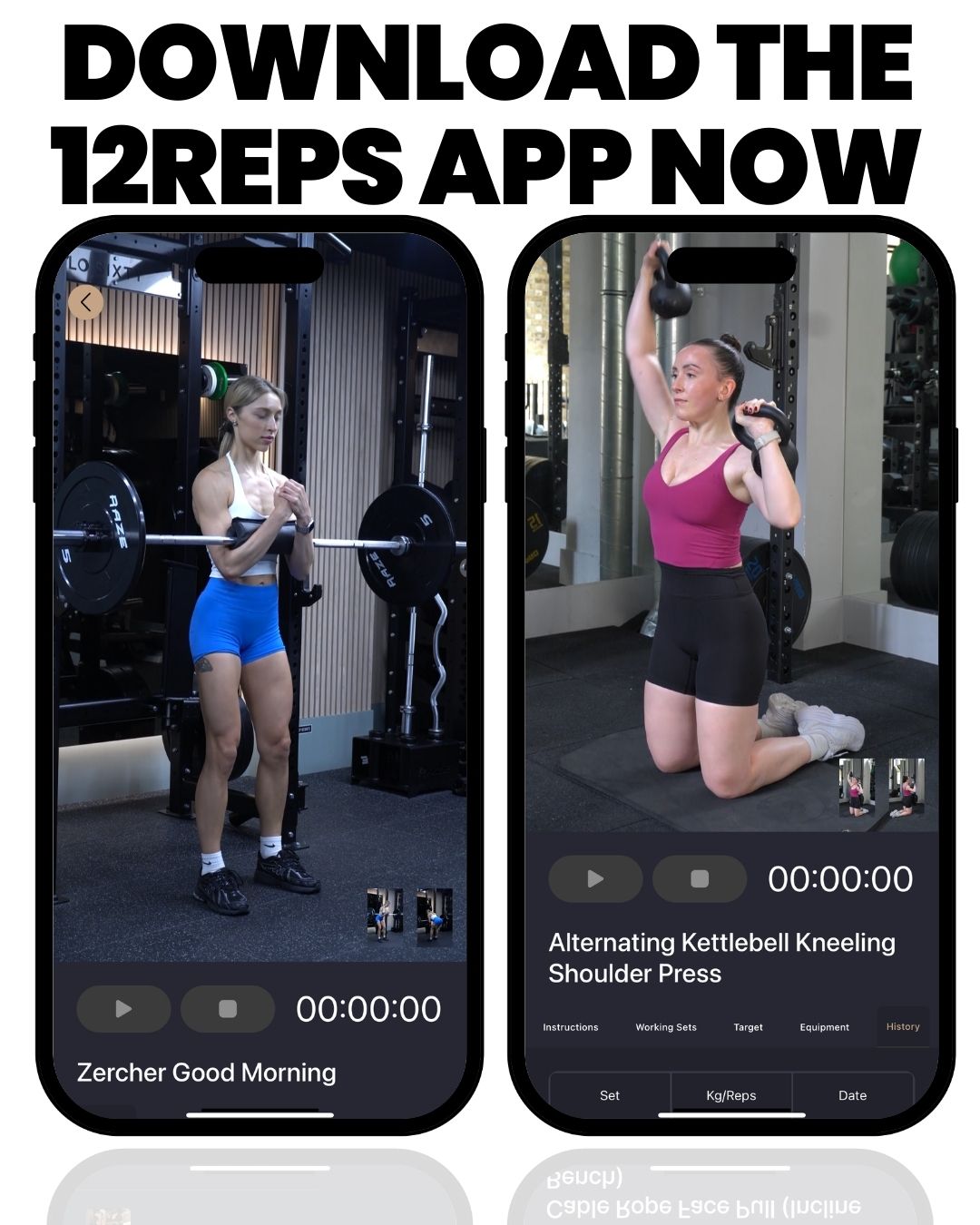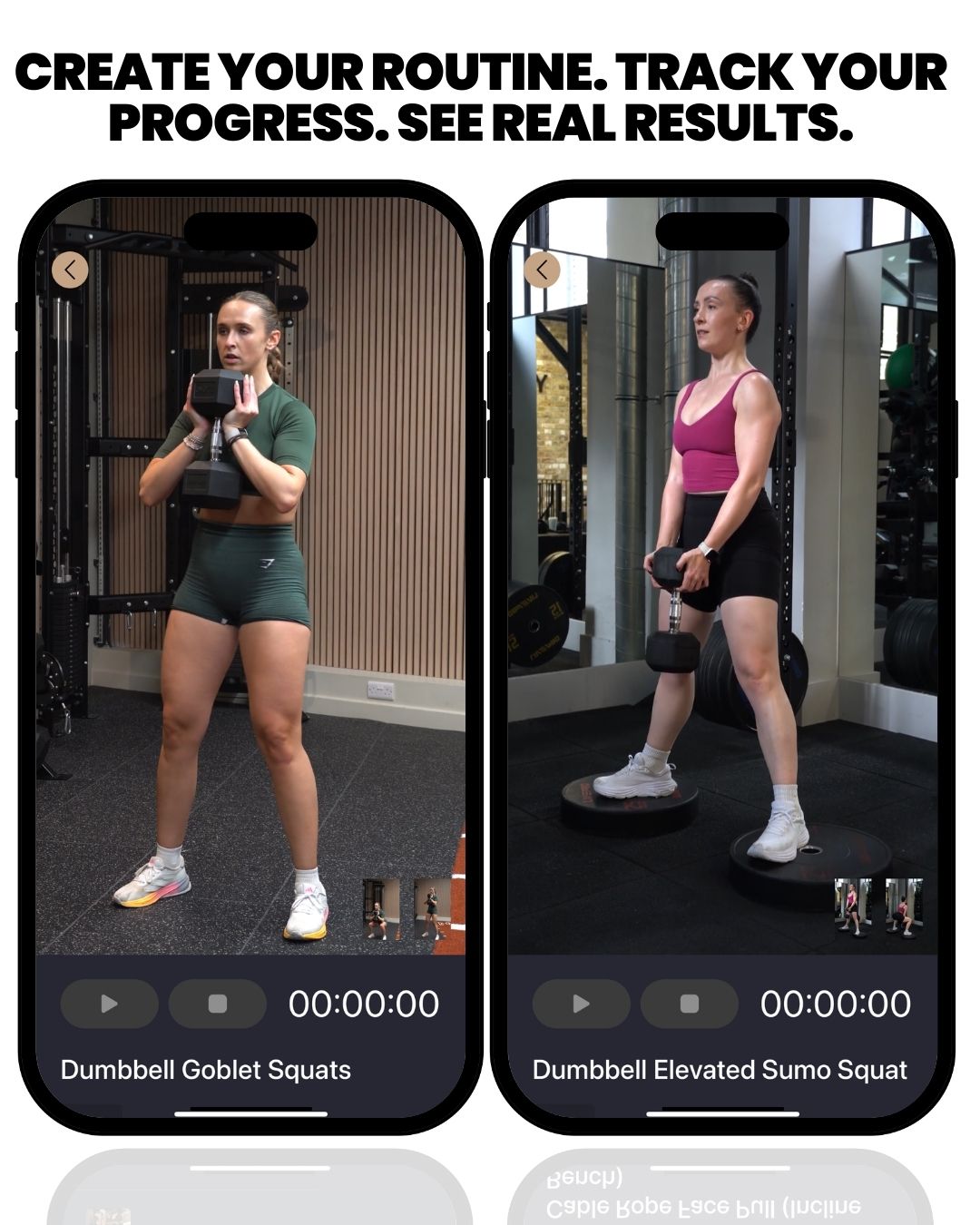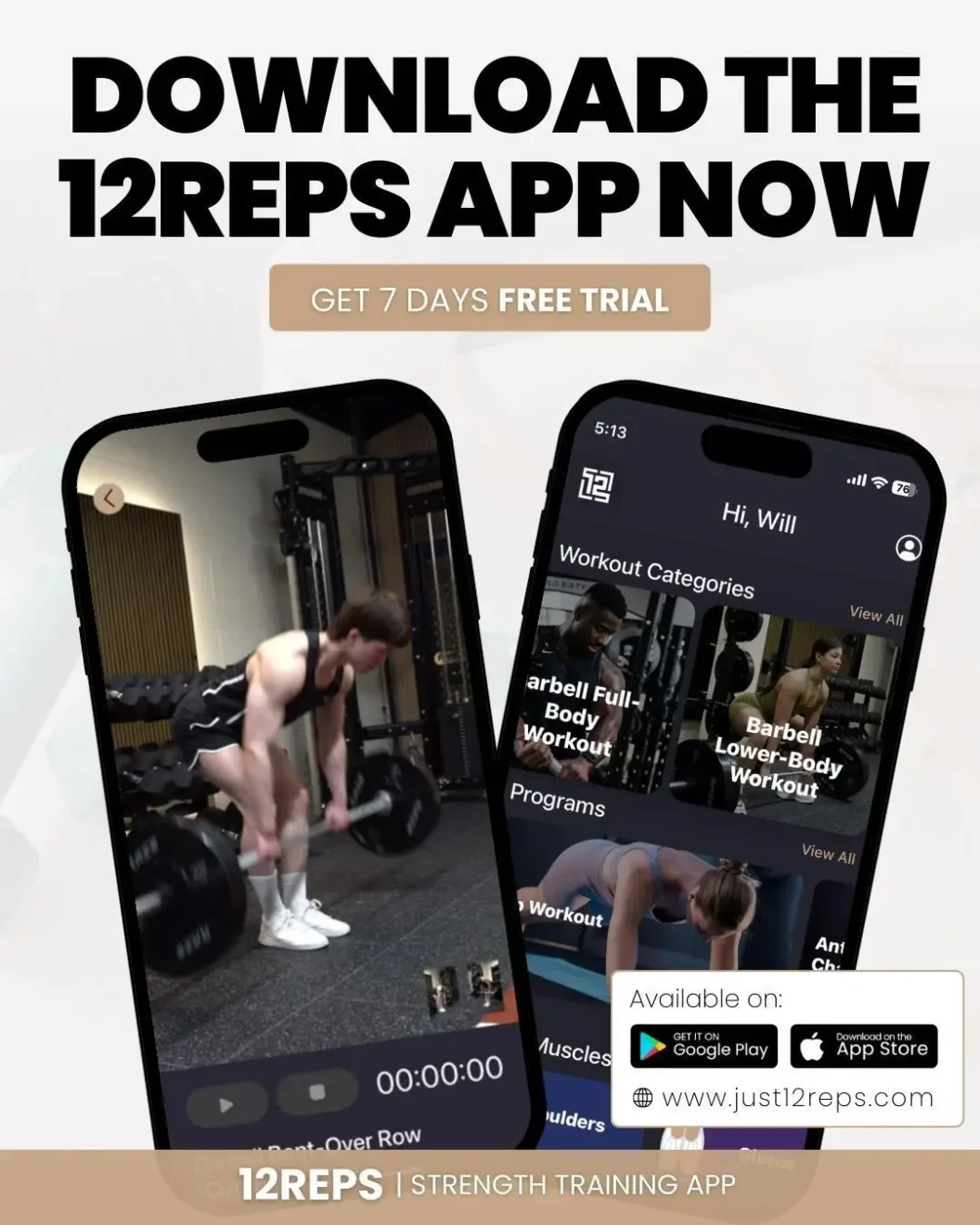By Will Duru, BSc (Hons) Sport & Exercise Science – Award-winning Personal Trainer (10+ year’s experience)
As a personal trainer, I’ve seen fitness technology evolve rapidly. There are countless strength training app options promising to help you get stronger, fitter, and leaner. Today, I’ll draw on my decade of coaching experience to compare five popular workout apps, 12Reps, JEFIT, Fitbod, Centr, and Hevy, and explain why I believe 12Reps stands out as the ultimate choice for building muscle and losing fat. My goal is to provide you with a clear and professional breakdown, enabling you to select the best workout tracker for your specific needs. Whether you’re a beginner looking for a free strength training program, an intermediate lifter tracking your 1RM, or anyone who wants to build muscle and lose body fat, read on for an expert’s perspective.

JEFIT, The Veteran Workout Tracker with Community Features
JEFIT has been a staple in weightlifting circles for over a decade. It’s essentially a workout planner and tracker rolled into one, with a huge user base and an old-school focus on data. One of JEFIT’s biggest strengths is its extensive exercise database – over 1,500 exercises with demos are available, ranging from barbell squats to bodyweight moves. This means you’ll never run out of exercises to try. The app allows you to create custom routines (or download routines others have shared, like popular push/pull/leg splits) and log every set, rep, and weight. JEFIT will even chart your progress over time, helping you track your 1RM maximum and total volume lifted for each exercise. For data-loving lifters, seeing those graphs of weekly tonnage or one-rep max improvements can be highly motivating.
Another strong point of JEFIT is its community aspect. The app includes a social feed and forums where you can share workouts, compare stats, and join challenges. There are leaderboards and the ability to follow friends, which adds a nice social element to what is often a solo effort. In many ways, JEFIT was an early fitness app that introduced the idea of a social network for lifters. I’ve had clients who enjoyed posting their PRs and seeing others’ progress – it can make training more fun and keep you accountable.
However, JEFIT isn’t without its drawbacks. Because it’s so feature-rich, the interface can feel a bit dated and overwhelming for new users. There’s a learning curve to navigate through all the tabs (Workouts, Exercises, Community, etc.), and it’s not the sleekest design compared to newer apps. More importantly, JEFIT doesn’t generate workouts for you, it’s not an “AI coach” or guided program app. In other words, you need to know what workout program you want to follow. For experienced lifters, that flexibility is fantastic: you can log strength training programs ranging from 5×5 powerlifting to a bodybuilding routine, or even a strength training routine for beginners you found online. But for beginners who don’t know where to start, JEFIT can feel like handing a blank notebook to someone who’s never written a workout before. There’s no virtual trainer telling you “do this exercise next.” If you’re indecisive or not well-versed in programming, you might struggle with analysis paralysis on JEFIT.
12Reps vs JEFIT: In my coaching experience, I’ve found that 12Reps fills this guidance gap. Like JEFIT, 12Reps offers a vast exercise library (over 1,000 movements demonstrated with proper form) and comprehensive logging, but it goes further by helping you personalise workouts on the fly. Instead of static routines, 12Reps uses a powerful filtering algorithm to suggest exercises based on your goals, muscle group, and available equipment. This means if you’re at a busy gym and the bench is taken, 12Reps can instantly filter for an alternative chest exercise. You’re never left wondering what to do – the app adapts to you, whereas with JEFIT, you have to adapt to the plan you set. JEFIT’s free version is a great free workout program tool for those on a budget, and I still recommend it to experienced lifters who love tinkering with their own programs. However, if you value ease and personalisation, 12Reps provides a more intuitive experience while still allowing you to log every rep and track your progress. It’s essentially like having JEFIT’s tracking plus a built-in personal trainer.

Fitbod, The AI-Powered Muscle Building App
Fitbod is a relatively new player that has quickly gained popularity by offering what many busy lifters crave: guided, adaptive workout routines. As a coach, I appreciate Fitbod for clients who walk into the gym thinking, “What do I do today?” This app serves as a virtual trainer, generating a customised workout for you with each session. In fact, over 15 million workouts have been logged on Fitbod, a testament to its widespread use and trust among lifters. Fitbod’s core strength is its AI-driven algorithm. You input your fitness goals (whether it’s building muscle, getting stronger, or improving endurance) and the equipment you have, and Fitbod will automatically suggest exercises, sets, and reps for the day. It’s excellent at removing guesswork. For example, if you did a heavy leg day yesterday, Fitbod knows not to target your legs again today; instead, it might switch to upper body or pull movements, even showing a recovery status for each muscle group. The app essentially aims to ensure you’re following good training principles, such as muscle rotation and progressive overload, incrementally increasing the weights or reps as you become stronger.
From a user perspective, Fitbod is very polished and easy to use. It has a large exercise library with animations, so if it tells you to do an exercise you’re unfamiliar with, you can quickly learn it in-app. It even has a nifty feature that highlights which muscles are fresh versus fatigued on a diagram, guiding your training split intuitively. I’ve seen clients enjoy the novelty Fitbod brings. One day, you might get dumbbell lunges, another day barbell squats, based on what you’ve been doing lately. This variety keeps things interesting and can help avoid plateaus. Essentially, Fitbod is like having a coach who says, “I’ve planned today’s workout for you,” which is great for those who want to build muscle and lose fat without spending time designing a program.
12Reps vs Fitbod: Both 12Reps and Fitbod share the philosophy of personalisation, but they execute it differently. Fitbod is very much “sit back and let the app tell you what to do.” 12Reps, on the other hand, empowers you to plan your training with guidance. It doesn’t brand itself as AI, but it uses smart filtering rules to help you build a routine that fits your situation in seconds. In practice, 12Reps gives you more transparency and control. You might tell it, “I want a 30-minute chest and back workout at home”, and it will give you a tailored routine, rather than a completely surprise mix.
Many of my clients love that 12Reps explains why certain exercises or rep schemes are chosen (drawing from sports science research and expert trainers’ input), effectively educating you as you train. Fitbod is a bit more of a black box, it’s great at giving you a solid workout, but you don’t always know the rationale behind it. Another edge for 12Reps is its focus on sustainable training. The app emphasises longevity and smart progression rather than just hammering you for the sake of today’s workout. It feels like having a knowledgeable coach who not only provides a workout but also closely monitors your overall development and recovery.
That said, if you absolutely hate planning and just want to be handed a workout every time, Fitbod’s fully automated style might appeal to you. But for a lot of people, especially those who want to learn and maintain some agency in their routine, 12Reps strikes a perfect balance: it’s personalised without making you a passive participant. You still get to input your preferences and adjust on the fly, and the app intelligently adapts with you. Importantly, 12Reps also includes robust progress tracking (charts, personal records, etc.), so like Fitbod, it will show your gains over time – but 12Reps does it in a very clear, user-friendly way that keeps you motivated by your own results.
Centr, The All-in-One Fitness, Nutrition, and Wellness App
Not everyone looking to get in shape is laser-focused on weightlifting stats, some want a more holistic health and fitness package. Centr caters to that crowd. This app was founded by Hollywood actor Chris Hemsworth (yes, Thor himself) and his training team, and it takes a comprehensive approach: Centr combines workouts, meal plans, and even mindfulness content in one place. Think of it as a digital fitness concierge that can plan your strength session, give you a healthy recipe for dinner, and suggest a meditation or yoga flow to wind down. For users who want everything in one app, Centr is very appealing.
The workouts in Centr are often video-based and led by trainers. You can find a variety of modalities – from strength training routines and HIIT cardio, to boxing drills, yoga, and Pilates. In terms of strength training, Centr does have programs you can follow (for example, a beginner dumbbell program or a muscle-building routine designed by one of Hemsworth’s trainers). However, unlike 12Reps or Fitbod, Centr does not algorithmically customise each workout to your past performance.
Instead, you typically pick a program or a daily schedule and follow along with the provided workouts. It’s a bit more traditional in that sense – like subscribing to a curated plan from a trainer, rather than an AI-driven regimen. What sets Centr apart is that it also tells you what to eat. The app features a comprehensive nutrition section with hundreds of recipes, meal plans tailored to various diets (including regular, pescatarian, vegetarian, etc.), and even grocery lists to simplify shopping. As a certified nutrition coach myself, I appreciate that Centr’s meal plans are created by dietitians and chefs, so the guidance is legit. They really emphasise healthy, balanced eating to complement your training.
For someone whose goal is to lose weight or just adopt a healthier lifestyle overall, Centr’s holistic approach can be a game-changer. It essentially gives you a structured path: “Here’s your workout for today and here’s what you should cook afterwards.” There’s also a mindfulness component – guided meditations and stress-reduction tips, recognising that wellness isn’t just about sets and reps. I’ve had general fitness clients (not just strength enthusiasts) do well on Centr because it kept them engaged on multiple fronts and felt like a one-stop shop for fitness, nutrition, and even mental well-being.
Now, on the flip side, Centr comes at a premium price and is not purely a strength training app. At around $29.99 per month on a rolling basis (cheaper per month if you commit to a year), it’s one of the more expensive fitness apps. You are paying for the breadth of content, workouts + meals + meditations – and for the Hemsworth brand. In my honest opinion, if you only care about lifting and tracking your progress in detail (like logging your weights, seeing your volume increases, etc.), a lot of Centr’s features might be extras you don’t utilise. Centr also doesn’t focus on features like 1RM tracking or progressive overload charts; that’s just not its niche. It’s less about hitting specific strength benchmarks and more about overall fitness and lifestyle.
12Reps vs Centr: These two apps are quite different in focus. Choosing between them comes down to your personal needs. If you are someone looking for a bodyweight training app or home workout program that also handles your diet and stress relief, Centr is a strong contender. It’s like hiring a full lifestyle coach. However, if your primary goal is strength training, getting stronger, building muscle, and tracking that progress, 12Reps is far more specialised for that purpose. 12Reps doesn’t give you recipes or meditation sessions, but it gives you an expertly guided strength training program that adapts to you and robust tools to measure your performance.
Hevy, A Free Workout Tracker with a Social Twist
Hevy is a relatively new app (launched in 2019) that has made a big splash by offering something very attractive: a completely free core app for logging and planning workouts, with a modern interface and social features. In fact, Hevy quickly amassed over 7 million downloads largely because it offers so much without charging users, even winning awards like Product Hunt’s top fitness product. As a personal trainer, I was initially sceptical of “free” apps (often they’re riddled with ads or extremely limited). But Hevy impressed me and many of my clients with how fully functional it is in its free version. You can log unlimited workouts, create your own routines, and view basic analytics ad-free, all without paying a cent. This easily makes Hevy one of the best free strength training program apps for anyone on a budget or just getting started.
Using Hevy feels a bit like using a fitness-focused social media combined with a workout log. The app’s design is sleek and user-friendly. When you work out, you can quickly input sets and reps, check off exercises, and even mark sets as warm-up or drop sets. It saves your previous lift numbers and displays them, so you know what PR to beat, making it great for driving progressive overload. The logging experience is comparable to apps like Strong (another pure logger) in its simplicity and speed. But where Hevy really differentiates itself is the community aspect. You can follow friends or other athletes, make your profile public or private, and share your workouts on a feed. I’ve seen users give each other “virtual fist bumps” and comments, like “Great job on that deadlift PR!” This kind of positive peer pressure is fantastic for motivation; it turns what can be a solitary routine into a supportive group effort. For those who thrive on accountability, having a few buddies on Hevy checking your workouts can spur you to stay consistent. There are even community challenges and leaderboards (like “most workouts this month”) that add a fun competitive element.
Hevy also excels in progress tracking for a free app. It automatically charts your lifts, displays your personal records, and tracks metrics such as total volume or estimated one-rep max over time. It’s very gratifying to finish a session and see a summary pop up: “You lifted X total pounds across Y exercises. New PR in bench press!” That instant feedback and celebration of progress are features I encourage, because seeing tangible proof of improvement keeps you engaged. The app is continuously evolving as well, the developers listen to the community and add features (for instance, they added body measurement tracking and a web version so you can analyse your data on a computer).
Of course, there are trade-offs with Hevy’s approach. There are community-shared routines, and some are quite good, but they aren’t vetted professionally. So, a novice might end up doing a subpar program if they just pick one at random. In contrast, an app like 12Reps or Fitbod is giving you a professionally designed routine tailored to you. With Hevy, you or your trainer needs to design the program; Hevy’s role is to help you log and interact. I often recommend Hevy to intermediate lifters or those who already have a program (such as someone doing a 5/3/1 strength cycle or a PPL split they like), because Hevy will track it beautifully and keep them motivated with friends.
However, I pair beginners with something more instructive. Another minor con: while the core features are free, Hevy does have a Pro tier at a very low cost (~$2.99/month) that unlocks advanced analytics and unlimited routine slots. The free version limits you to a few saved routines and basic charts. This isn’t a huge issue, given the price is modest and the free offering is generous; it’s more just something to note as you grow with the app. Lastly, Hevy’s social feed is only as good as you make it – if none of your friends use the app, you might not care about the community features (though you can still follow strangers or just use it solo). It’s also very strength-centric; like JEFIT, it’s built for weight training and gym workouts first and foremost, so it has minimal guidance for cardio or classes (you can log a run, but it won’t track your pace or map).

12Reps, Personalised Strength Training Redefined
Let’s talk about 12Reps, the app I genuinely consider a standout in today’s fitness app landscape. Biased? Perhaps, I’ve been involved in its development, but that involvement stems from my genuine belief in what it offers to lifters. Simply put, 12Reps is designed to be your personal strength coach and training partner. It was built by a team of personal trainers (myself included) who wanted an app that fixes the common pitfalls we see in other solutions. We wanted to eliminate cookie-cutter routines, lack of progression, and the confusion many beginners face. The result is an app that adapts to you and grows with you, ensuring every workout is tailored to your needs and effective.

Key Features and What Makes 12Reps Stand Out:
- Smart, Filtering-Powered Workouts: 12Reps uses intelligent filtering algorithms to help you generate a workout tailored to your needs in seconds. You choose the body part or type of workout (e.g., strength, hypertrophy, or even a quick bodyweight training app-style session if you’re travelling with no equipment). Input what equipment you have available – anything from just your bodyweight and a pair of dumbbells at home, up to a full gym, and how much time you’ve got. The app instantly provides a custom routine aligned to those specifics. This means no more scrolling through random routines or doing exercises that don’t make sense for you. It’s not “AI magic” per se; it’s better described as your preferences + proven exercise science = a workout that fits like a glove. And unlike pure AI apps, 12Reps is transparent about not blindly randomising things; it filters based on sensible criteria. You remain in control, with the app doing the heavy lifting of programming logic.
- Expert-Backed Exercise Guidance: All exercises in 12Reps are demonstrated via video by certified trainers, and the library is massive (1,500+ exercises and growing). We didn’t want users guessing how to perform a movement. From the basics like deadlifts and push-ups to more nuanced moves, you can see proper form and get coaching cues. It’s like having a trainer by your side, demonstrating each exercise. What I love is that the app also occasionally provides context, explaining why a certain exercise is in your plan or which muscles it targets, helping you learn as you go. Many apps have videos, but 12Reps’ routines themselves are built on sports science principles curated by professionals, so the guidance is baked into the plan. This reduces your risk of injury and accelerates progress, because you’re doing things the right way for the right reasons.
- Adaptive Progress Tracking: One of the most motivating features of 12Reps is its emphasis on tracking and visualising your progress. I always tell my clients, “What gets measured gets managed,” and 12Reps takes that to heart. Every set and rep you log is tracked in your personal analytics. The app will show you graphs of your strength gains, such as your increases in squat or bench press 1RM, your total volume lifted this month versus last, and even insights like which muscle groups you’ve been hitting the most. If you’ve been consistently using 12Reps, at the end of the month, you can literally review how far you’ve come; it might show, for example, that you added 20 kg to your squat max or that you completed 10 more workouts this quarter than the last. This kind of feedback is pure gold for motivation. It keeps you pushing because you can see the muscle-building, fat-loss journey unfolding in data that confirms your hard work is paying off. And if something is lagging, you notice it and can adjust your training (or ask the app for a different focus). Progress tracking isn’t an afterthought in 12Reps; it’s a core part of the experience to keep you engaged.
- Community and Support (Upcoming): While 12Reps started as a very training-focused app, it’s rapidly evolving to integrate more community features. The team recognises that a supportive environment can be key in keeping people on track. Features on the roadmap include the ability to follow friends, share milestones, and potentially join group challenges. So if you’re worried you’d miss out on the social side that apps like Hevy offer, rest assured, it’s coming. You’ll soon be able to have that camaraderie on 12Reps too, effectively making the app a one-stop hub for both personal coaching and fitness community. (As of writing, I can already see this unfolding, and it’s exciting to watch 12Reps grow.)

Now, with all these features in mind, let’s address why 12Reps truly stands out in this comparison. It boils down to personalisation and balance. 12Reps hits a sweet spot between guidance and flexibility that other apps struggle to find. Unlike JEFIT or Hevy, you don’t have to design your entire program from scratch; the app helps you do it smarter. Unlike Fitbod, it doesn’t hide the plan or rationale from you; you get tailored workouts without feeling like you’re on autopilot. And unlike Centr, 12Reps is 100% focused on strength training and optimising it, it’s not trying to be your meditation app or diet app. All its resources are dedicated to making it the best strength training app possible. From a coach’s perspective, I see 12Reps as an app that can make my job easier and my clients more self-sufficient. It’s like having me in their pocket, ensuring they don’t stray from effective training principles when they’re working out on their own time.
To illustrate, think about a beginner who’s trying to lose weight and tone up. They may be intimidated by the gym or unsure about which exercises to do. If they use 12Reps, they receive a clear plan each session that fits their schedule (even 20-minute home workouts are possible) and their equipment needs. The app might start them with fundamental movements and an appropriate volume, allowing them to achieve results without excessive soreness. It will adapt as they get fitter, adding more reps, suggesting more weight, or introducing new exercises when they’re ready. It’s progressive overload and periodisation delivered in an intuitive way. That same app can be used by an intermediate lifter who’s plateaued, say, someone who always did the same 3-day push/pull/legs rotation. 12Reps can spice up their routine by filtering in new exercises or techniques they hadn’t considered, breaking through the plateau. And for advanced folks, while they might know a lot already, 12Reps can act as a second brain to manage the nitty-gritty of programming or just save them time on planning days. It’s scalable to the user’s knowledge level.
Crucially, the results speak for themselves. People using 12Reps consistently are seeing tangible improvements, and they often report that it keeps them more accountable. There’s something psychologically powerful about not wanting to “miss” a planned workout when the app has it ready for you, it nudges you to stick to your schedule. And if life gets in the way, you can easily adjust the plan on the spot rather than feeling like you failed a preset program.

In my professional opinion (and I say this wearing both my trainer hat and user hat), 12Reps is the ultimate strength training companion for anyone serious about their fitness journey. It truly brings together the best aspects of the other apps into one package. You get the rich data and community of a tracker like JEFIT or Hevy, the smart programming of Fitbod, and the polish and credibility of Centr’s expert-led approach – all focused on making you stronger and healthier. It’s no surprise that for those seeking a truly personalised, results-driven experience, 12Reps stands out as the superior choice . My clients who use it feel like they have me coaching them even on days we don’t meet – and that’s exactly what we envisioned.
At the end of the day, the best app is one that you will use consistently. 12Reps makes that easy by being intuitive, adaptive, and motivating. Every rep is recorded, every workout is purposeful, and you can literally see yourself getting better over time. It’s like having a knowledgeable friend (who happens to be a trainer) with you at each workout, ensuring you’re on track to hit your fitness goals.
If you’re ready to take your strength training to the next level, I highly encourage you to download the 12Reps app today and give it a try. There’s a free trial, so you can experience firsthand how it tailors workouts to you and keeps you progressing. Don’t waste any more time on generic routines or guesswork – let 12Reps provide you with a clear, customised roadmap to success. It’s time to invest in yourself and make every workout count. Your stronger, fitter, and leaner future self will thank you!











